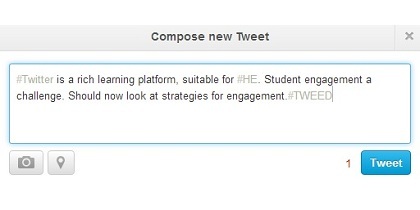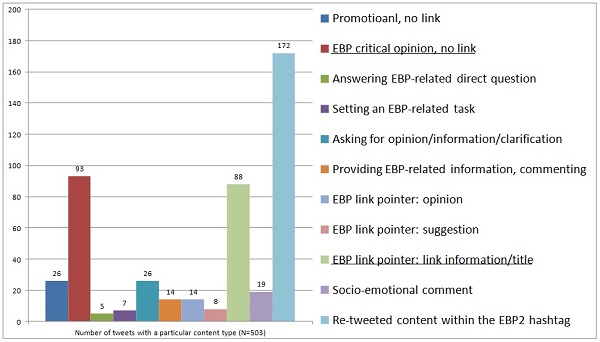
March 6, 2014, by Teaching at Nottingham
The TWEED Project
Roger Kerry and Natasa Lackovic: “The TWEED (Twitter in Education) project ran between 28th August 2012 and 16th December 2013 and used a mixed methods approach to explore the educational value and utility of using the social micro-blogging site Twitter in higher education. We believed that peer-level social interaction would develop deep and sustained meaningful learning in our students, and used Nottingham’s existing research at the Division of Physiotherapy and Rehabilitation Sciences, looking at the impact of social learning in the classroom, as a springboard to further explore global social interaction media as a platform for higher education students’ learning.
“A discreet, open access Twitter hashtag was created, linked to an Undergraduate Physiotherapy module at Nottingham, and students were encouraged to participate in micro-blogging during and after lectures with a weekly Twitter reminder from their tutor. The hashtag was active for 13 weeks. Data was collected from multiple sources including student focus groups, user questionnaires and Tweet content analysis, and results showed a generally positive but highly cautious attitude towards the use of Twitter in learning from Undergraduates.
“The study found Twitter to have a rich and dynamic educational value, but targeted HE students did not meaningfully engage. Rather the discourse was taken over by experienced physiotherapy professionals engaging from elsewhere in the Twitter-sphere. This in itself is an advantageous characteristic of open-access media, but in this case represented an obstacle for student engagement. The educational environment reflected a worldwide, multi-user community of practice, and obstacles emerging from the study offer an opportunity for future research into strategies to facilitate novice entry into a rich and mutually nourishing learning environment.

The graph represents the richness of tweet content as generated within the EBP2 hash tag. Explanation: “link pointer” means that a tweet includes a web link and the tweet content “points at” that link in some way, providing a personal opinion about the link, a suggestion relevant to the link and just an information about the link (e.g. an article/blog title).
“Student ownership is crucial to the success of introducing social media to the classroom, and future endeavours would need to start from students (peer-peer), then include the tutor (peer-peer-tutor) shifting then to the inclusion of other professionals in the field, to demonstrate a rich community discourse (peer-peer-tutor-professionals). The next logical stage is to focus on educational research activity of scaffolding and strategic curriculum design which is aimed at facilitating the novice learner involvement in rich educational networks, and/or developing novice-specific networks.
“The TWEED Project was funded by the Higher Education Academy (GENTDG169) and The University of Nottingham’s Teaching and Learning Strategy.”
Roger Kerry
Associate Professor/MSc (Manual Therapy) Leader, Faculty of Medicine & Health Sciences
and Natasa Lackovic
PhD, Research Fellow and Teaching Assistant

[…] TWEED project was one Nottingham venture with Physiotherapy students. Students were fairly active reader of […]